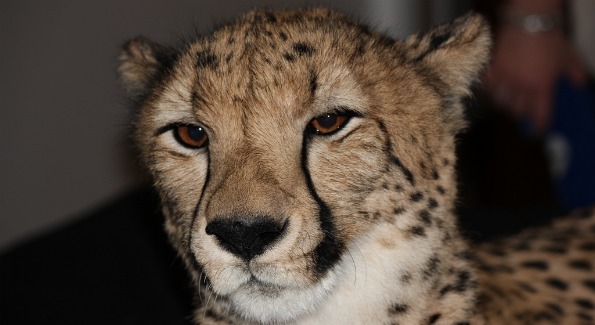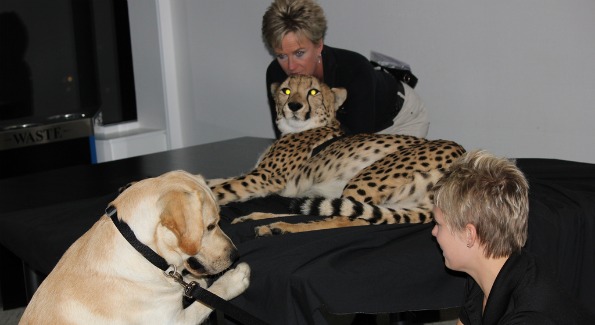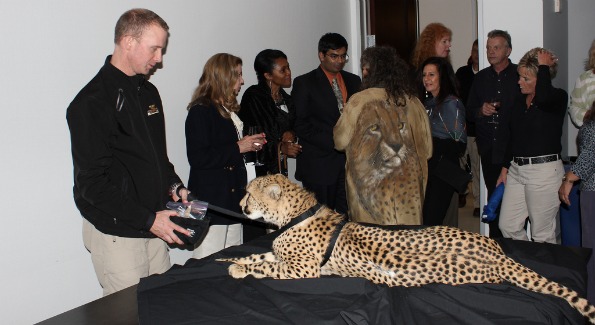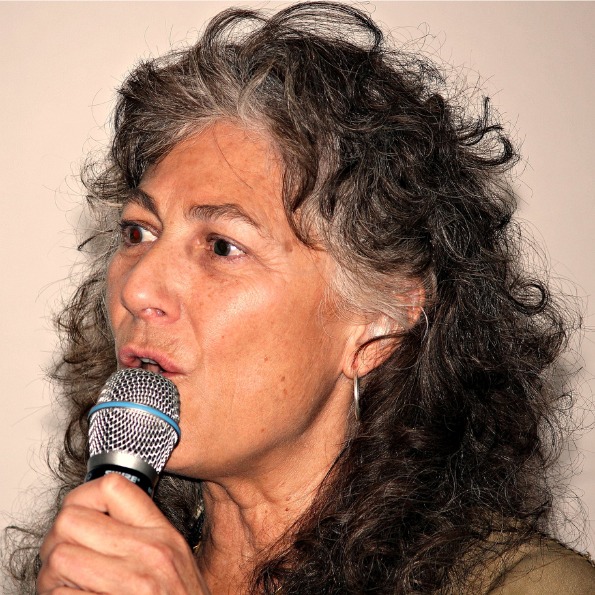In Georgetown, even exotic animals fundraise.
By John Arundel and Elena Pinnen

"Moya," a unique animal ambassador brought in from the Columbus Zoo by the Cheetah Conservation Fund's DC Chapter for its 10th annual fundraising benefit. Photo by John Arundel.
If you happened to be around the offices of the Georgetown law firm of Foley & Lardner late one night last week and spotted a cheetah coming down the hallway, don’t be alarmed.
She was there to fundraise.
“Moya,” a unique animal ambassador brought in from the Columbus Zoo by the Cheetah Conservation Fund‘s DC Chapter for its 10th annual fundraising benefit, majestically lay down on a conference table overlooking the Potomac River and allowed attendees to scratch her belly and rub her ears.
Then, as the speeches rolled, Moya took a fitful nap.
The fastest land animal and the oldest of all the big cats in Africa, the cheetah is a real icon of the continent. It has been revered for thousands of years because of its speed and beauty. Able to reach speeds of more than 110 km/hr over short distances, the animal’s entire body is built for speed, from its semi-retractable claws that act as cleats, to its oversized heart and lungs that supercharge its blood with oxygen, to its muscular tail that acts as a counterbalance when the cat makes a sharp turn at speed.
“The cheetah is the only big cat that purrs and chirps like a bird,” said wildlife conservationist Dr. Laurie Marker, who founded the Cheetah Conservation Fund (CCF) in 1990.
But over the past century the wild cheetah population has plummeted. The fast and elegant cheetah is considered one of Africa’s rarest big cats, with a world-wide population of about 10,000 individuals in Africa and less than 100 Asian cheetahs in Iran, Marker said. Because cheetahs are built more for flight than fight, they are easily pushed out of protected areas by larger predators.
With 3,000 of them, Namibia hosts the largest remaining wild cheetah population – about one-third of the world’s numbers. “More than 95 percent of the cheetahs in Namibia are found on livestock farms and game ranches, and because cheetahs are active during the day they are often blamed—rightly or wrongly—for many livestock and game kills,” Marker said.
Nearly everywhere else this fantastic predator has been hunted and killed, becoming extinct in 16 countries over the past 60 years. It was exactly for this reason that Marker packed up her bags two decades ago and moved to Nambia, establishing the Cheetah Conservation Center at a farm there in 1990.
“I had visited Namibia several times before, and farmer after farmer admitted—bragged even—about the numbers of cheetahs they killed every year,” she said. “My first goal was to find out why farmers killed so many cheetah. Did they have direct evidence that cheetahs were the problem, or did they simply attribute kills to cheetah because they are more visible than other predators? What methods did farmers use to protect their animals? Were they interested in adapting their methods if it would help them lose fewer animals?”
What she found was that farmers blamed the cheetah for much of their losses; yet these farmers had few if any methods in place to discourage predators from taking their livestock. Additionally, farmers admitted that they trapped or killed cheetahs as a preventative measure, not in response to actual livestock losses.
These days the CCF is the internationally recognized center of excellence in the conservation of cheetahs and their ecosystems. Employing a holistic approach to saving the cheetah, Marker and her team indefatigably works to resolve the Human/Wildlife conflict, to ensure a peaceful survival of cheetahs for the long term. Marker teaches farmers “cheetah-friendly” methods of livestock management, conducting environmental education programs for schoolchildren or using livestock guardian dogs.
Lacey Braun, the Chief Cheetah Keeper, said that the approach has always paid great attention to scientific research and high-tech methods, such as artificial insemination or DNA analysis.
To reach her end goal with cheetahs, Marker employs conservation strategies such as intensive habitat restoration, the promotion of open lands and the harvesting of invasive bush for use as fuel source, and, above all, “sharing what we know about cheetahs.”
“Mainly what we do at the Cheetah Conservation Fund,” she pointed out with determination, “is revolved around people”.
Dr. Marker, recognized as one of the world’s leading experts on cheetahs and one of Time Magazine’s Heroes for the Planet, said that next year it’s likely the CCF will undertake a new project of cheetah reintroduction in India – where the cheetah has been extinct for 60 years – by importing them directly from Southern Africa.
The reception ended with a delicious buffet by Clyde’s Restaurants of Georgetown, washed down by a selection of top wines donated by Total Wine and More. The silent auction featured jewels, vintage coats, necklaces, handbags, scarfs, but also donated works of arts and books.
Jennifer Holand, the senior writer for National Geographic magazine, was signing her new book, Unlikely Friendships, a collection of tales narrating friendships formed between polar opposites in the animal world, such as the Cheetah and the Anatolian Dog which shepherds and watches over it.
“We do what we do because we love cheetahs,” Marker said. “Cheetahs are the world’s most special animals….what we do and what we need to do in the future is to save them.”

"The cheetah is the only big cat that purrs and chirps like a bird," said wildlife conservationist Dr. Laurie Marker, who founded the Cheetah Conservation Fund in 1990. Photo by John Arundel.

Moya majestically lay down on a conference table overlooking the Potomac River and allowed attendees to scratch her belly and rub her ears. She's joined here by a labrador retriever; in Africa, Anatolian Dogs protect the cheetah. Photo by John Arundel.





